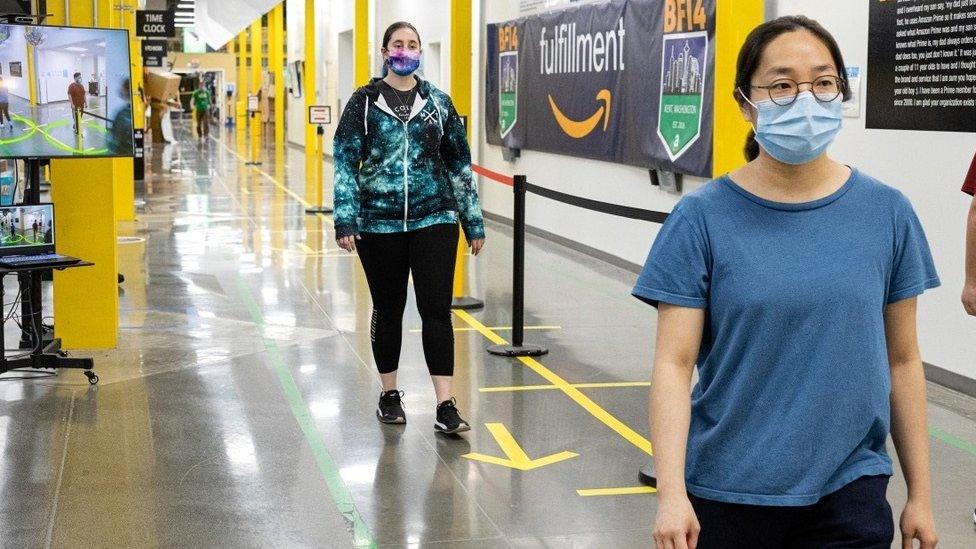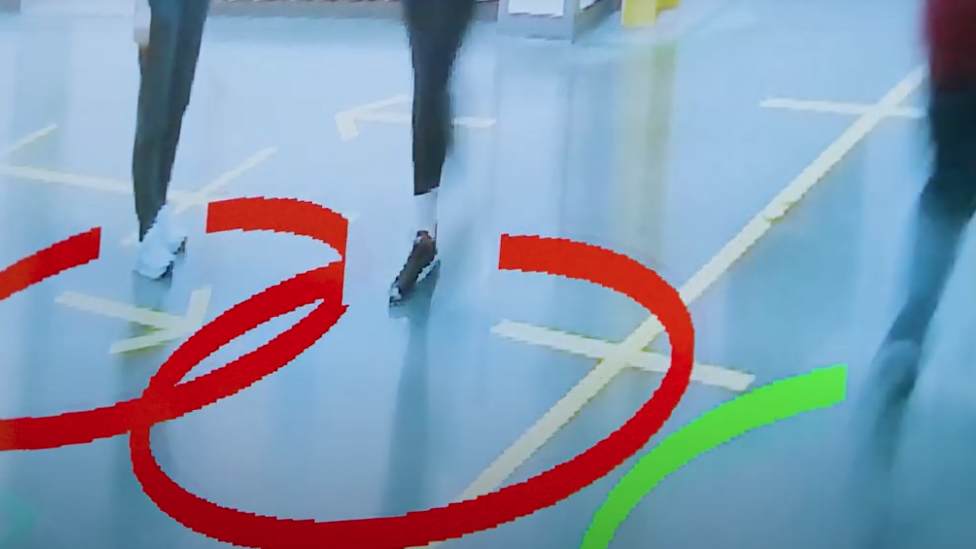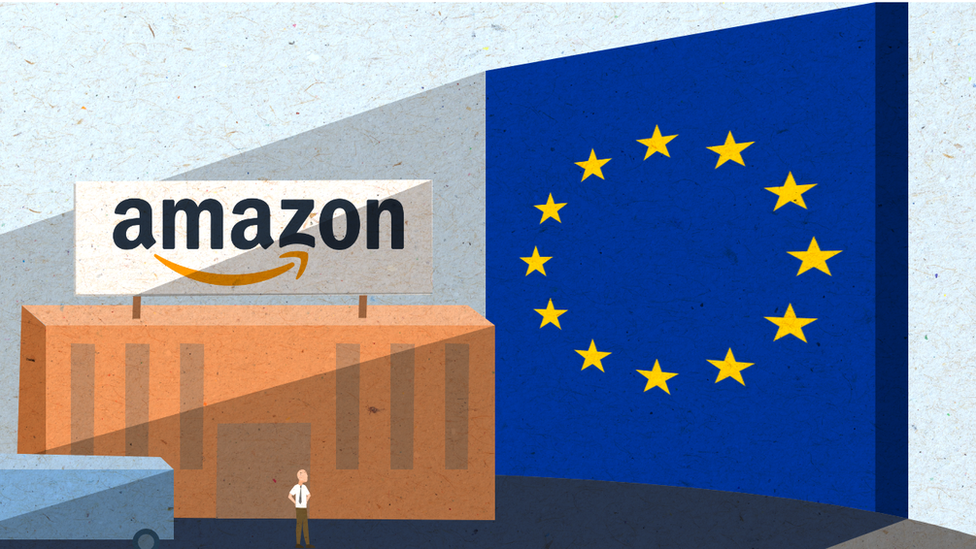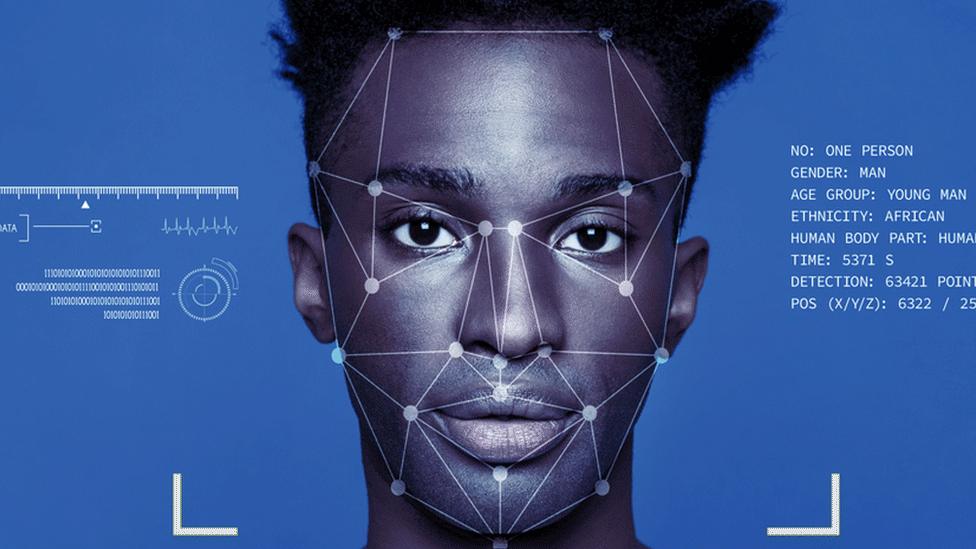Amazon faces backlash over Covid-19 safety measures
- Published

Amazon has not revealed how many of its workers have tested positive for Covid-19
Amazon is introducing new technology to keep employees safe at work, including a wearable device that alerts staff if they get too close to each other.
The retail giant has faced lawsuits in both Europe and the US claiming it is not doing enough to prevent the spread of Covid-19 in its warehouses.
One US union accused the firm of profiting from the pandemic while leaving its workers unprotected.
Amazon said it had invested billions in Covid-19 initiatives.
The firm is now testing a wearable device that alerts workers when they are violating social distancing rules, according to CNBC, which obtained a memo about the technology, external.
The clear plastic sleeve beeps and lights up if workers get too close to each other.
According to the report, it will initially be tested in one warehouse in Washington.
Comments on a private online forum for Amazon warehouse employees indicated that staff were not impressed.
One suggested that the battery would be killed "so fast" because it is "impossible to keep 6ft [1.8m] apart".
Another commented: "They would probably have a lot of people quit if they do make this a mandatory thing."
A third employee compared it to an episode of Black Mirror, a Netflix drama which examines how technology could create a dystopian society.
Machine learning

Green and red circles indicate whether employees are 6ft apart or not
Amazon has also just announced Distance Assistant, external, another a new tool in its efforts to contain the spread of coronavirus in its warehouses.
The device provides visual overlays on a screen to show how close people are to each other. Those who are the required distance apart will be shown with green circles around them, while those too close are highlighted with red circles.
It uses machine learning to differentiate people from their surroundings and, combined with depth sensors, creates an accurate distance measure.
The device is being tested in a handful of warehouses.
In a blog, Amazon's vice president of robotics Brad Porter wrote "nothing is more important than the health and well-being of our employees".
Some workers think the retail giant needs a more radical change of policy.
Three Amazon employees who work in the JFK8 fulfilment centre in Staten Island, New York, have launched a lawsuit alleging that the company's leave policies and failure to do thorough contact tracing of ill workers' interactions "have put us all at risk".
Among the urgent changes called for in the complaint are:
leave policy should encourage workers to stay at home without fear of losing their jobs
prompt payment of quarantine leave
an increase in the allowance for Time off Task, so workers can wash their hands and clean work stations
More thorough disinfection of a facility after a worker tests positive
The lawsuit is supported by New York union Make The Road. Deborah Axt, co-executive director said: "The largest corporation in the world has been profiting off the Covid-19 crisis while leaving its workers unprotected and at risk of getting sick and even dying."
In response to the claims of the lawsuit, Amazon told the BBC: "We are saddened by the tragic impact Covid-19 has had on communities across the globe, including on some Amazon team members and their family and friends.
"From early March to 1 May, we offered our employees unlimited time way from work, and since 1 May we have offered leave for those most vulnerable or who need to care for children or family members.
"We also invested $4bn [£31.bn] from April to June on Covid-19 related initiatives, including over $800m in the first half of this year on safety measures like temperature checks, masks, gloves, enhanced cleaning and sanitisation, extended pay and benefits options, testing and more.
"This includes two weeks paid leave for any Covid diagnosis or quarantine, and launching a $2m fund to support our partners and contractors."
In April a French union successfully sued Amazon over the delivering of non-essential items such as DVDs and beauty products. The firm temporarily shut warehouses across the country after a court ruled that it had not adequately consulted the employee works council on coronavirus safety protocols.
- Published16 June 2020

- Published11 June 2020
